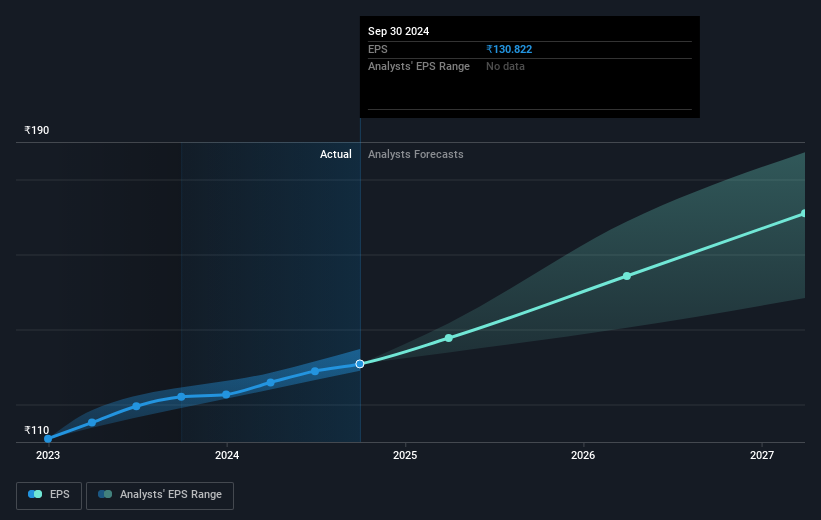Tata Consultancy Services (NSE:TCS) jumps 4.1% this week, though earnings growth is still tracking behind five-year shareholder returns

The main point of investing for the long term is to make money. But more than that, you probably want to see it rise more than the market average. But Tata Consultancy Services Limited (NSE:TCS) has fallen short of that second goal, with a share price rise of 91% over five years, which is below the market return. On a brighter note, more newer shareholders are probably rather content with the 24% share price gain over twelve months.
On the back of a solid 7-day performance, let's check what role the company's fundamentals have played in driving long term shareholder returns.
Check out our latest analysis for Tata Consultancy Services
To quote Buffett, 'Ships will sail around the world but the Flat Earth Society will flourish. There will continue to be wide discrepancies between price and value in the marketplace...' One flawed but reasonable way to assess how sentiment around a company has changed is to compare the earnings per share (EPS) with the share price.
Over half a decade, Tata Consultancy Services managed to grow its earnings per share at 8.7% a year. This EPS growth is slower than the share price growth of 14% per year, over the same period. So it's fair to assume the market has a higher opinion of the business than it did five years ago. And that's hardly shocking given the track record of growth.
The graphic below depicts how EPS has changed over time (unveil the exact values by clicking on the image).

Dive deeper into Tata Consultancy Services' key metrics by checking this interactive graph of Tata Consultancy Services's earnings, revenue and cash flow.
What About Dividends?
When looking at investment returns, it is important to consider the difference between total shareholder return (TSR) and share price return. Whereas the share price return only reflects the change in the share price, the TSR includes the value of dividends (assuming they were reinvested) and the benefit of any discounted capital raising or spin-off. Arguably, the TSR gives a more comprehensive picture of the return generated by a stock. In the case of Tata Consultancy Services, it has a TSR of 110% for the last 5 years. That exceeds its share price return that we previously mentioned. This is largely a result of its dividend payments!
A Different Perspective
Tata Consultancy Services shareholders are up 27% for the year (even including dividends). Unfortunately this falls short of the market return. The silver lining is that the gain was actually better than the average annual return of 16% per year over five year. This suggests the company might be improving over time. Before forming an opinion on Tata Consultancy Services you might want to consider these 3 valuation metrics.
But note: Tata Consultancy Services may not be the best stock to buy. So take a peek at this free list of interesting companies with past earnings growth (and further growth forecast).
Please note, the market returns quoted in this article reflect the market weighted average returns of stocks that currently trade on Indian exchanges.
Valuation is complex, but we're here to simplify it.
Discover if Tata Consultancy Services might be undervalued or overvalued with our detailed analysis, featuring fair value estimates, potential risks, dividends, insider trades, and its financial condition.
Access Free AnalysisHave feedback on this article? Concerned about the content? Get in touch with us directly. Alternatively, email editorial-team (at) simplywallst.com.
This article by Simply Wall St is general in nature. We provide commentary based on historical data and analyst forecasts only using an unbiased methodology and our articles are not intended to be financial advice. It does not constitute a recommendation to buy or sell any stock, and does not take account of your objectives, or your financial situation. We aim to bring you long-term focused analysis driven by fundamental data. Note that our analysis may not factor in the latest price-sensitive company announcements or qualitative material. Simply Wall St has no position in any stocks mentioned.
About NSEI:TCS
Tata Consultancy Services
Provides information technology (IT) and IT enabled services in the Americas, Europe, India, and internationally.
Flawless balance sheet 6 star dividend payer.


